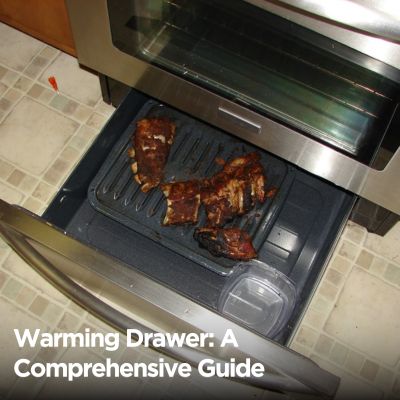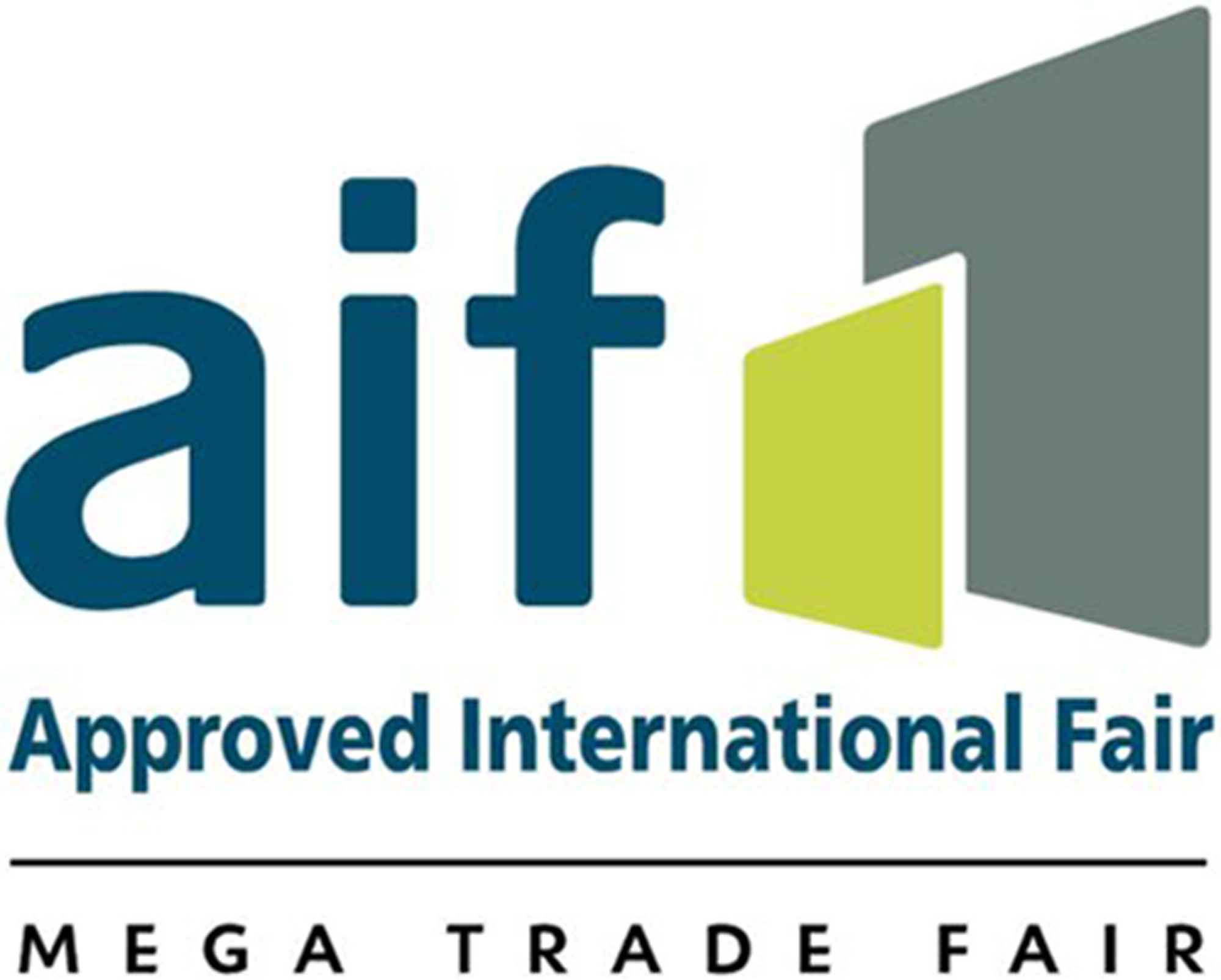Can the right kitchenware truly impact a restaurant’s success? Absolutely! But first, what is kitchenware? It refers to all the essential tools, utensils, and appliances for preparing, cooking, and serving food.
Kitchenware is critical not just in home kitchens but also in professional environments like commercial kitchens. When whipping up a family dinner or handling high-volume food service, the right kitchen tools and equipment make a significant difference.
In a fast-paced setting like a restaurant, using the right restaurant equipment is essential for maintaining food quality, ensuring safety, and delivering an efficient workflow. Let’s explore what kitchenware incorporates and why it’s vital to the hospitality industry.
What is Kitchenware?
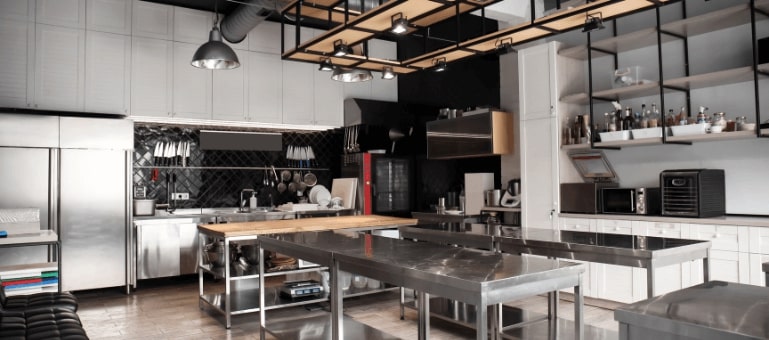
So, what is kitchenware? Kitchenware is any tool, utensil, appliance, or machine that helps prepare, cook, and serve food.
This category includes various items, from basic tools like knives and cutting boards to advanced machinery like commercial stoves and refrigerators. Kitchenware is necessary to complete tasks efficiently in any kitchen, whether a home or commercial kitchen.
In the hospitality industry, the quality of kitchen equipment can make or break a restaurant or catering business’s success. Poorly made utensils or unreliable appliances can lead to delays, safety hazards, or inconsistencies in food quality.
On the other hand, high-quality kitchen machinery ensures smooth operation, allowing staff to focus on delivering excellent service. Choosing the right food service equipment is critical for maintaining safety, efficiency, and overall food quality, especially when serving large volumes of people.
Types of Kitchen Equipment
1. Cooking Equipment
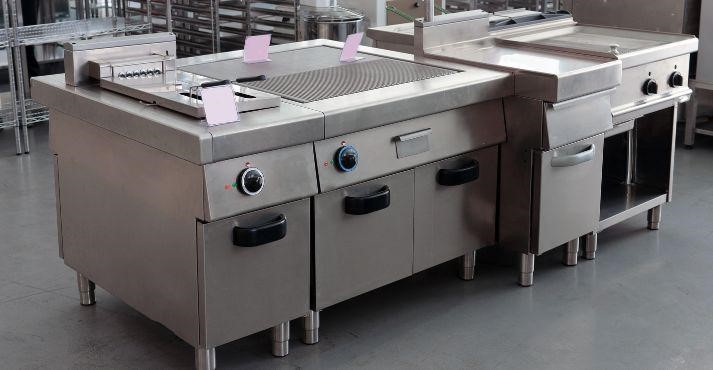
The backbone of any kitchen is its cooking equipment. Even if it’s a small cafe or a large restaurant, every kitchen needs reliable stoves, ovens, grills, and fryers to meet the demands of daily service. Let’s explore some of the most important kitchen equipment used in a commercial kitchen setting:
- Stoves and Ovens: Stoves are the most essential part of any kitchen. Various types of stoves are used in commercial kitchens, including gas, electric, and induction stoves. Gas stoves are a favorite in many professional kitchens because they provide better control over heat levels. Electric and induction stoves, on the other hand, offer energy efficiency and faster cooking times. Ovens are equally important, and they come in various types, such as convection ovens (which use fans to distribute heat evenly), combi ovens (which combine steam and heat for versatile cooking), and microwave ovens for quick reheating. Each of these has a distinct role in preparing different types of dishes.
- Grills and Fryers: Grills are commonly used in restaurants to cook meats, vegetables, and seafood. They come in different types, such as charcoal grills, gas grills, and electric grills, each offering unique flavors and textures to the food. Fryers like deep and air fryers are fundamental for preparing fried foods like french fries, chicken, and tempura. Deep fryers submerge food in hot oil to cook it quickly, while air fryers use hot air for a healthier, oil-free option. Both are essential in many commercial kitchen
- Sous Vide Machines: A modern addition to restaurant equipment, sous vide machines are becoming increasingly popular in professional kitchens. Sous vide involves vacuum-sealing food and cooking it slowly in a temperature-controlled water bath. This method ensures precise cooking, consistently producing tender, juicy, and consistent food. It’s a favorite in fine dining restaurants, allowing chefs to control the cooking process perfectly.
2. Food Preparation Equipment
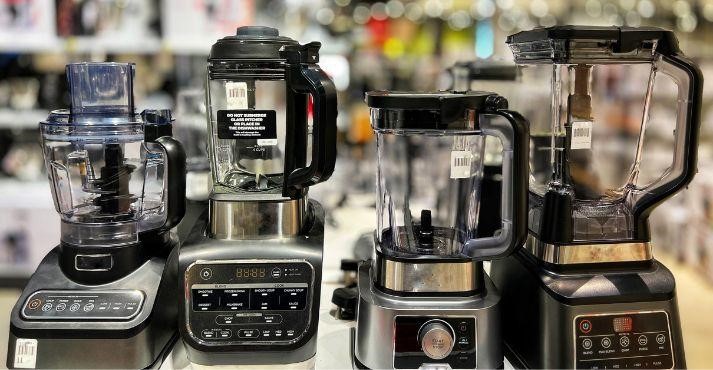
Proper food preparation is key to running an efficient kitchen, and the right food service equipment can speed up the process while ensuring consistency and safety. Here are some of the most important types of food preparation equipment used in professional kitchens:
- Mixers and Blenders: Mixers and blenders are essential in a commercial kitchen. Heavy-duty stand mixers, such as dough mixers, are commonly used in bakeries and restaurants to mix large batches of dough, batter, or sauces. These machines are built to handle heavy workloads and ensure consistent mixing. Conversely, blenders are indispensable for making smoothies, soups, sauces, and purees. They come in different sizes, from personal to industrial blenders, and are designed to blend ingredients to the desired texture quickly and efficiently.
- Food Processors and Choppers: Time is money in a professional kitchen, and food processors and choppers save a lot of both. Food processors are multipurpose machines that slice, dice, chop, and puree ingredients. This eliminates the need for manual chopping and ensures uniformity in ingredient size, which is important for consistent cooking times. Choppers are more specialized and typically quickly chop vegetables, fruits, or herbs.
- Slicers and Peelers: Precision is critical when slicing meats, cheeses, and vegetables. Meat slicers cut meats into thin, even slices, while mandolins are great for finely slicing vegetables. Manual and electric peelers are essential for quickly peeling fruits and vegetables without wasting too much produce. These tools are particularly useful in high-volume kitchens where speed and precision are essential.
3. Storage Equipment
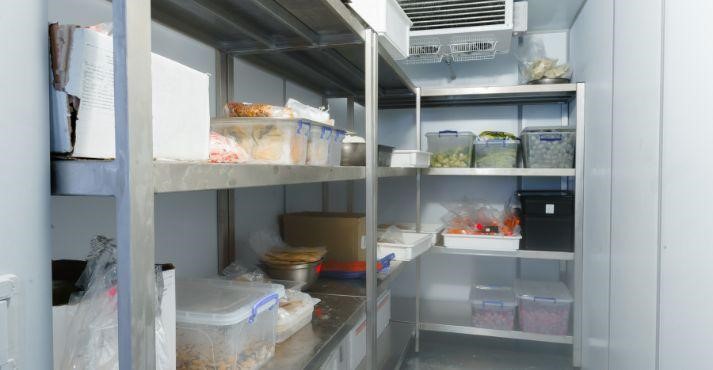
Keeping ingredients fresh and organized is a top priority, especially in a commercial kitchen. Therefore, kitchenware for storage and relevant equipment plays a decisive role in food safety, efficiency, and overall kitchen organization.
- Refrigerators and Freezers: Proper refrigeration equipment is important in any commercial kitchen. Different types of refrigerators and freezers are used depending on the size of the kitchen and the type of food being stored. Walk-in refrigerators are large, room-sized units that allow staff to store large quantities of perishable items at safe temperatures. Reach-in refrigerators, on the other hand, are smaller units that provide easy access to frequently used ingredients. Blast freezers are often used to rapidly freeze food, locking in freshness and ensuring that ingredients are preserved for long-term use.
- Shelving and Racking: Organization is key in a busy kitchen, and shelving and racking systems help keep everything in its place. Metal shelves are commonly used in pantries, storage rooms, and walk-in refrigerators to store ingredients, tools, and small equipment. Organized storage makes it easier to find what you need quickly and helps maintain cleanliness and order in the kitchen.
- Food Containers: Proper food storage containers are essential for food safety and freshness. These containers come in various sizes and materials, such as plastic, stainless steel, or glass. They are used to store ingredients, leftovers, or prepared food. Airtight containers help prevent contamination and keep food fresh for extended periods. Labeling these containers is essential for ensuring proper food rotation and minimizing waste.
4. Serving Equipment
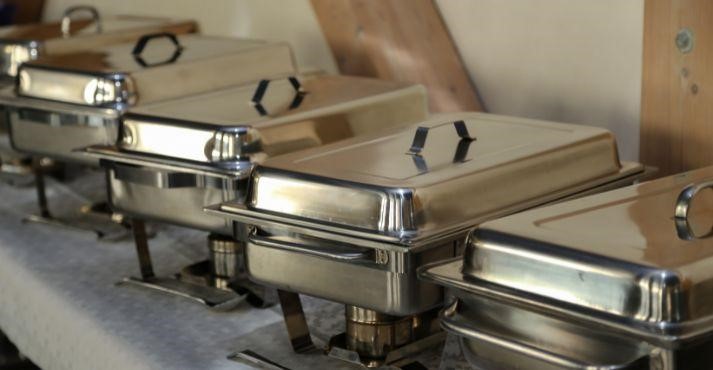
Once the food is prepared, it needs to be served appealingly and efficiently. This is where serving equipment comes into play. Proper serving equipment makes the food look great and stays at the correct temperature during service.
- Chafing Dishes and Bain-Marie: In buffet-style settings, chafing dishes and bain-maries keep food warm. Chafing dishes are heated using candles or burners and are ideal for serving large quantities of food. Bain-Maries, which use hot water to heat food gently, are often used for soups and sauces that need to stay warm over a long period without overcooking.
- Buffet Display Ware: In hospitality settings, presentation is just as important as the taste of the food. The right buffet displayware can make a big difference. From serving trays and platters to decorative stands and warming trays, buffet display ware helps make food look more appealing and easier for guests to access.
- Serving Utensils: Any professional kitchen needs a wide variety of serving utensils, from tongs and ladles to carving stations and spatulas. These kitchen utensils make it easier for staff to serve food efficiently and help control portion sizes. In large catering or buffet settings, properly organized serving stations with the right kitchen utensils are essential for smooth service.
5. Cleaning and Sanitation Equipment
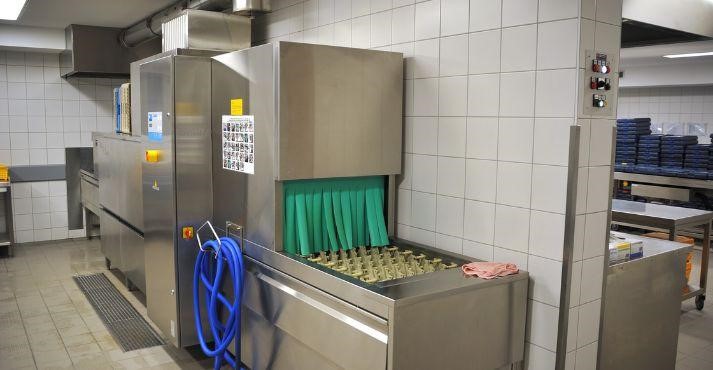
Maintaining cleanliness in the kitchen is not just about hygiene—it’s a legal requirement. The right cleaning and sanitation equipment helps ensure that all kitchen tools, utensils, and surfaces are cleaned and sanitized thoroughly to prevent foodborne illnesses and contamination.
- Dishwashers: In a commercial kitchen, manual dishwashing isn’t fast enough to meet the demand. Commercial dishwashers are designed to clean large volumes of dishes, utensils, and kitchenware quickly and effectively. Conveyor dishwashers can handle hundreds of plates per hour, making them ideal for high-volume operations, while under-counter dishwashers are more compact and suitable for smaller kitchens.
- Sanitizing Equipment: Sanitizers, sinks, and steam cleaners ensure that all kitchen equipment and surfaces are free of bacteria and contaminants. Many commercial kitchens also use steam cleaning machines to disinfect surfaces and appliances without chemicals, which is an eco-friendly option.
- Waste Management: Efficient waste management is a must in a busy kitchen. Garbage disposals, recycling bins, and composting systems help keep waste organized and reduce the kitchen’s environmental footprint. Properly disposing of food waste and separating recyclables can create a more sustainable kitchen operation.
6. Specialty Equipment
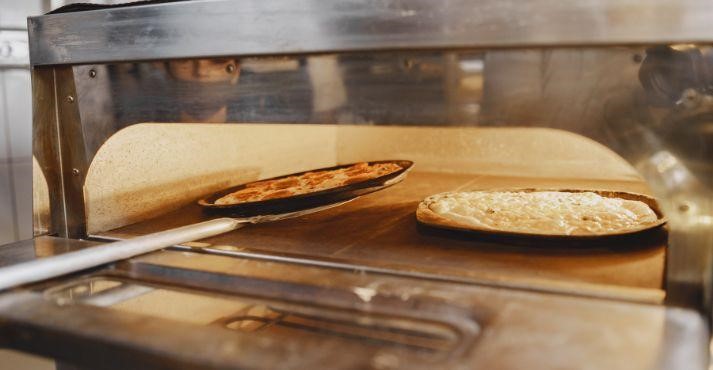
In addition to general-purpose kitchen equipment, many commercial kitchens rely on specialty equipment to cater to specific food items or services. This type of equipment is often tailored to the menu or the type of food being served.
- Coffee Machines: Coffee is essential to many restaurants, cafes, and hotels. From espresso machines to drip brewers, coffee machines are vital restaurant equipment. High-quality coffee machines allow businesses to serve consistent, delicious coffee to their customers.
- Pizza Ovens: For restaurants specializing in pizza, having the right pizza ovens is key. Wood-fired ovens, conveyor ovens, and deck ovens are commonly used to bake pizzas to perfection. Each type of oven brings its unique flavor and texture to the pizza, with wood-fired ovens offering an authentic, smoky, highly sought-after taste.
- Bar Equipment: Bar equipment is essential for preparing and serving drinks in bars and restaurants. Ice makers, shakers, and glassware are all essential for making cocktails and other beverages. Proper bar equipment ensures drinks are served cold, fresh, and professionally.
How to Choose the Right Kitchenware for Your Hospitality Business?
Choosing the right kitchenware for your hospitality business can seem overwhelming, but careful planning and consideration can help you make the best choices. Here are a few key factors to keep in mind:
1. Assessing Needs
The first step in choosing the right kitchen equipment is assessing your kitchen’s specific needs. What kind of food will you be preparing? How much space do you have available? What’s the expected volume of service?
If you run a high-volume restaurant, you might need heavy-duty kitchen machinery, while a small café might need more compact appliances. Tailoring your equipment to your menu and service style ensures your kitchen operates efficiently.
2. Budget Considerations
Kitchenware can be expensive, but it’s important to invest in high-quality equipment that will last. Inexpensive tools might save you money upfront but could cost more in repairs and replacements over time. Look for durable, reliable equipment that balances cost with performance.
3. Supplier Selection
Choosing a reputable supplier is crucial. Not only do you want to buy from someone who offers high-quality products, but you also want to ensure that they provide good after-sales service, such as warranties, repairs, and replacement parts. This is especially important when purchasing restaurant equipment you’ll use daily.
4. Future-Proofing
When choosing kitchenware, think about the future growth of your business. Will your kitchen need to expand or upgrade its equipment down the line? Investing in scalable or modular equipment allows you to adapt as your business grows, saving you money and headaches later.
Conclusion
Recognizing and learning what kitchenware is and its importance in a professional setting is essential for the success of any commercial kitchen. The right kitchen equipment can make all the difference, from preparing food quickly to serving it safely and efficiently.
Whether you’re opening a new restaurant, upgrading your existing food service equipment, or simply looking to improve the efficiency of your kitchen, investing in high-quality, durable kitchenware is critical.
When you assess your needs while balancing quality with cost and planning for future growth, you can ensure that your kitchen is well-equipped to handle the demands of the hospitality industry for years to come.






